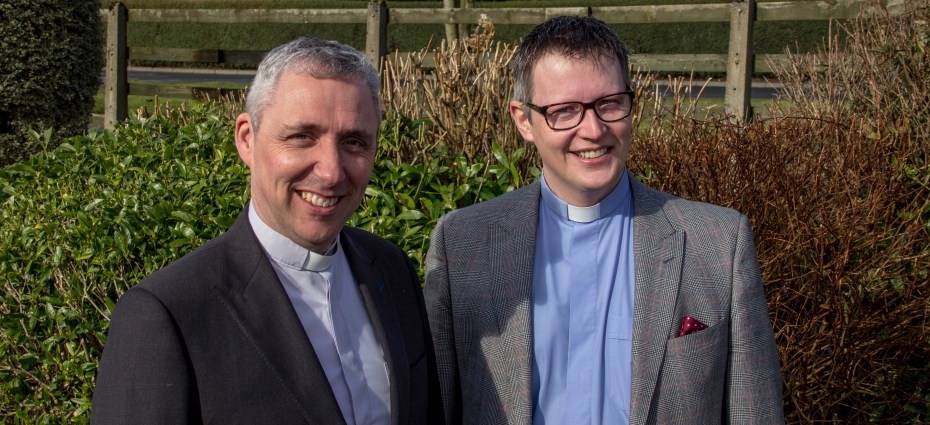
Forgiveness builds the Common Good
Tribalism and division of all kinds are rampant today, and that can make the concept of forgiveness seem irrelevant. But two church leaders in Northern Ireland have forged an unlikely friendship that builds the Common Good. They’ve co-authored a book to share what they have learned.
Just say the name of the second biggest city in Northern Ireland, and you might also be revealing your sympathies. Call it “Londonderry” and people here could suspect that you’re on the side of the Protestant loyalists. And if you say “Derry,” well, that’s what the Catholic nationalists call the city. In an attempt at evenhandedness, the dual name of Derry/Londonderry came about.
“The Troubles officially ended 20 years with the Good Friday Agreement. But the sectarian divide still runs through Derry. It’s not only lived memory, this is living today,” Father Paul Farren told me. “If someone belonging to you is murdered, you live every day without them. The fact is they’re not here and they were taken out of your life through the action of another person and through violence,” said Farren, parish administrator at St. Eugene’s Catholic Cathedral.
Archdeacon Robert Miller, a Church of Ireland rector who leads a group of four churches in the city, also has parishioners who suffered during the Troubles. “It’s like saying, ‘Right, we’re a post-conflict society,’ which I don’t actually think is true. I think we’re still emerging from that conflict.”
One of the churches where Miller serves is just across the street from St. Eugene’s – their parishes adjoin one another on the edge of the Bogside. But the two men are more than neighbours – they’ve become friends.
Farren and Miller published a book together called Forgiveness Remembers: A Journey into the Heart of God (2017). In one sense, the book is about one of the core teachings of the Christian faith. But in our current age of outrage — with all the Twitter fights, Facebook rants, and endless partisan vitriol – a concise piece of writing about the power of forgiveness seems quite radical.
One of the main points they wanted to make about forgiveness is that it’s not easy. “We would be very careful to always acknowledge that it is very difficult and very painful for some people. How do you forgive somebody who murdered your mother?” “How can you speak about forgiveness in that context? And yet, that’s the challenge.”
Farren added it would have been strange indeed if he and Miller never bothered to get to know each other, since they are neighbours and they are both priests. But their friendship is not typical. Like other unlikely partnerships before them – Cardinal Manning and William Booth for example, and David Sheppard and Derek Worlock – Farren and Miller see themselves as brothers in Christ.
“I knew that I could teach Robert an awful lot of things,” Farren joked, getting a hearty laugh out of Miller. “But it was going to take an awful long time to do it, so I was in it for the long haul.” Farren and Miller have an easy rapport and they tease each other constantly.
“‘Forgive and forget’ is almost a paradigm that society seems to apply,” Miller said. But that can take away the voices of people who’ve been hurt the most: that’s partly where ‘Forgive and Remember’ came from.”
The core message of the book, unsurprisingly, comes from a Christian perspective. But the authors wrote it with non-religious people in mind too. Tribalism and division of all kinds are rampant in today’s world, Farren said. And that can prevent communities from building the Common Good as well as making the concept of forgiveness seem irrelevant.
“Jonathan Sacks says peace causes a crisis of identity,” commented Farren. “When we’re fighting, we know who we’re not. We might not know who we are, but we certainly know who we’re not. And we’re not the other crowd.”
“Sacks says we create differences to shore up our insecurity: this is the tribal way we’re living in our world, it’s everywhere. We see it in the United States, and we see it here. We see it in the Republic of Ireland, we see it in Europe, we see it in the United Kingdom. It’s everywhere.”
And this is where Farren and Miller’s book can become controversial. Justice, they say, is important. And the same goes for personal responsibility. But their partnership is testament that the only way to live in peace and flourish together – to build a Common Good – is through forgiveness.
When you forgive another person, yes, you do in a sense let them go, you don’t get the eye for the eye. But you also let yourself go,” Farren said. “There’s a freedom for the person who forgives.Forgiveness is a gift to yourself.
Miller put it this way: “Will you allow the pain of the past to define your future? Or will you allow the hope of a positive future to be the thing that opens us up to release that pain?”
“Robert and I never fall into the trap of saying it’s simple. But when we can’t forgive,” Farren added, “it’s like living with clenched fists. It affects all of your life. When you forgive, in a sense, you open your fist and you’re liberated and you’re free.”
Click the bar below to play a short interview with Miller and Farren.
Forgiveness Remembers: A Journey into the Heart of God (Farren, Miller 2017)
Better Together (Sheppard, Worlock, 1988) is available as an e-book.
With thanks to Public Radio International.
